Here are some events that happened on October 18th. It could be an event or a person that died or was born on that day
1871 Died: Charles Babbage, English mathematician and engineer, invented the mechanical computer (b. 1791)
Charles Babbage (26 December 1791 – 18 October 1871) was an English polymath. A mathematician, philosopher, inventor and mechanical engineer, Babbage originated the concept of a digital programmable computer.
Considered by some to be "father of the computer", Babbage is credited with inventing the first mechanical computer that eventually led to more complex electronic designs, though all the essential ideas of modern computers are to be found in Babbage's Analytical Engine. His varied work in other fields has led him to be described as "pre-eminent" among the many polymaths of his century.
Parts of Babbage's incomplete mechanisms are on display in the Science Museum in London. In 1991, a functioning difference engine was constructed from Babbage's original plans. Built to tolerances achievable in the 19th century, the success of the finished engine indicated that Babbage's machine would have worked.
Stamps from Great Britain commemorating Babbage
1886 Died: Philipp Franz von Siebold, German physician and botanist (b. 1796)
Philipp Franz Balthasar von Siebold (17 February 1796 – 18 October 1866) was a German physician, botanist, and traveler. He achieved prominence by his studies of Japanese flora and fauna and the introduction of Western medicine in Japan. He was the father of the first female Japanese doctor, Kusumoto Ine.
Though he is well known in Japan, where he is called "Shiboruto-san", and although mentioned in the relevant schoolbooks, Siebold is almost unknown elsewhere, except among gardeners who admire the many plants whose names incorporate sieboldii and sieboldiana. The Hortus Botanicus in Leiden has recently laid out the "Von Siebold Memorial Garden", a Japanese garden with plants sent by Siebold. The garden was laid out under a 150-year-old Zelkova serrata tree dating from Siebold's lifetime. Japanese visitors come and visit this garden, to pay their respect for him.
German stamp depicting von Siebold
1889 Died: Antonio Meucci, Italian-American engineer (b. 1808)
Antonio Santi Giuseppe Meucci (13 April 1808 – 18 October 1889) was an Italian inventor and an associate of Giuseppe Garibaldi, a major political figure in the history of Italy. Meucci is best known for developing a voice-communication apparatus that several sources credit as the first telephone.
Meucci set up a form of voice-communication link in his Staten Island, New York, home that connected the second-floor bedroom to his laboratory. He submitted a patent caveat for his telephonic device to the U.S. Patent Office in 1871, but there was no mention of electromagnetic transmission of vocal sound in his caveat. In 1876, Alexander Graham Bell was granted a patent for the electromagnetic transmission of vocal sound by undulatory electric current. Despite the longstanding general crediting of Bell with the accomplishment, the Italian Ministry of Cultural Heritage and Activities supported celebrations of Meucci's 200th birthday in 2008 using the title "Inventore del telefono" (Inventor of the telephone). The U.S. House of Representatives also honored Meucci in a resolution in 2002 for having had some role in the development of the telephone, although the U.S. Senate did not join the resolution and the interpretation of the resolution is disputed.
Italian stamps depicting Antonio Meucci
1921 Died: Ludwig III of Bavaria (b. 1845)
Ludwig III (Ludwig Luitpold Josef Maria Aloys Alfried; 7 January 1845 – 18 October 1921) was the last king of Bavaria, reigning from 1913 to 1918. He served as regent and de facto head of state from 1912 to 1913, ruling for his cousin, Otto. After the Bavarian parliament passed a law allowing him to do so, Ludwig deposed Otto and assumed the throne himself. He led Bavaria into World War I, and lost his throne along with the other rulers of the German states at the end of the war.
On 7 November 1918, Ludwig fled from the Residenz Palace in Munich with his family and took up residence in Schloss Anif, near Salzburg, for what he hoped would be a temporary stay. He was the first of the monarchs in the German Empire to be deposed. The next day, the People's State of Bavaria was proclaimed.
On 12 November 1918, a day after the Armistice, Prime Minister Dandl went to Schloss Anif to see the King. Ludwig gave Dandl the Anif declaration (Anifer Erklärung) in which he released all government officials, soldiers and civil officers from their oath of loyalty to him. He also stated that as a result of recent events, he was "no longer in a position to lead the government." The declaration was published by the newly formed republican government of Kurt Eisner when Dandl returned to Munich the next day. Ludwig's declaration was not a statement of abdication, as Dandl had demanded. However, Eisner's government interpreted it as such and added a statement that Ludwig and his family were welcome to return to Bavaria as private citizens as long as they did not act against the "people's state." This statement effectively dethroned the Wittelsbachs and ended the family's 738-year rule over Bavaria.
Edison was raised in the American Midwest; early in his career he worked as a telegraph operator, which inspired some of his earliest inventions. In 1876, he established his first laboratory facility in Menlo Park, New Jersey, where many of his early inventions were developed. He later established a botanic laboratory in Fort Myers, Florida in collaboration with businessmen Henry Ford and Harvey S. Firestone, and a laboratory in West Orange, New Jersey that featured the world's first film studio, the Black Maria. He was a prolific inventor, holding 1,093 US patents in his name, as well as patents in other countries. Edison married twice and fathered six children. He died in 1931 of complications of diabetes.
US and Hungarian stamp featuring Edison and or his inventions
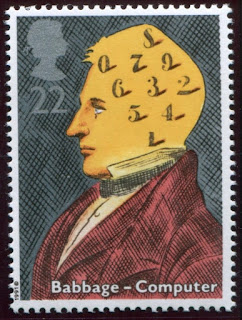


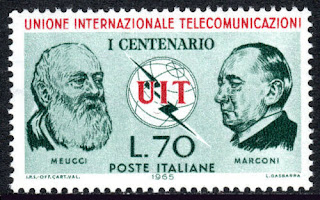


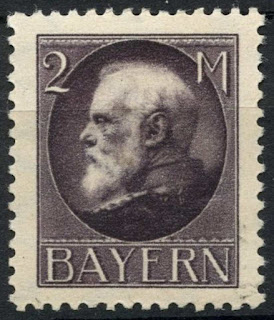
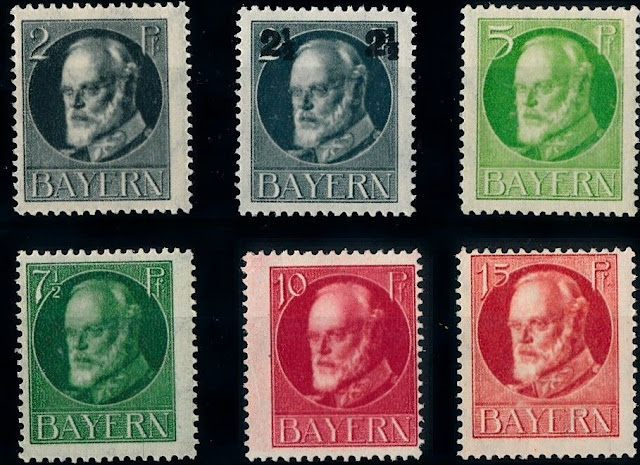

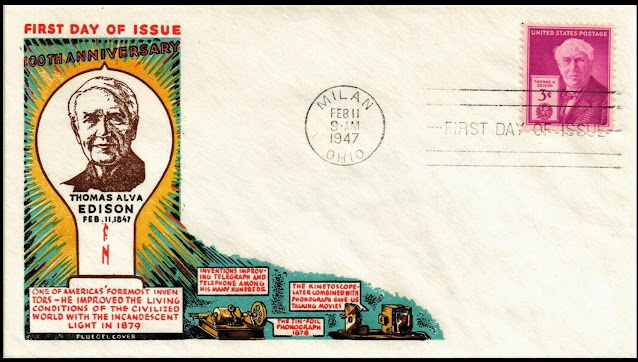

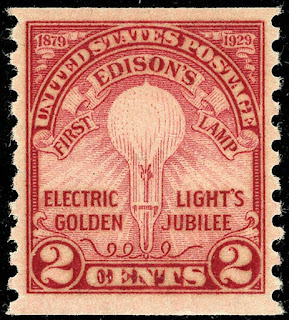

No comments:
Post a Comment